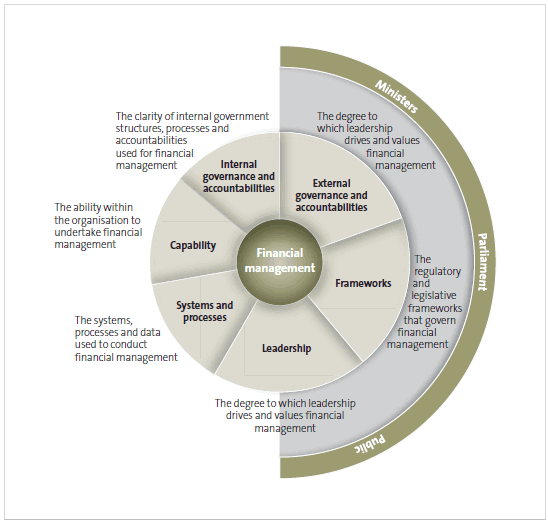Part 2: Best practice financial management in government
2.1
In this Part, we summarise what best-practice financial management is and the factors affecting how it is implemented within and throughout government.
Strong financial management practices
2.2
The financial management system underpins good government and good business. It does so by ensuring that (internal and external) stakeholders can understand and control how well an organisation plans for and uses financial resources. In practice, this means that the right information is provided at the right time to the right people (the supply side) and that the information provided is then considered and used in understanding and controlling the organisation (the demand side).
2.3
As Figure 2 shows, there are four main practices of financial management:
- budget management;
- financial controls;
- value management; and
- governance and accountability.
2.4
Each practice consists of certain inter-related activities, reliant on, and made possible by, a solid foundation of the other activities.
2.5
Budget management means managing the sources of funding and expenditure, and allocating those resources in line with organisational priorities and their cost effectiveness. The main prerequisites for managing budgets include understanding:
- sources of funding, and lining these up with outputs and outcomes;
- long-term strategy, priorities, and how to prioritise;
- how cost-effective activities are in achieving desired outcomes; and
- how to comply with central government budget submission and review processes.
2.6
Effective budget management happens when funding and expenditures are in line with strategic priorities and based on a clear understanding of performance expectations.
2.7
Financial controls mean rules, processes, and procedures that address risks and assure that financial resources are being recorded and used in the right way, for the right purpose, and at the right time. The main prerequisites for financial control include understanding:
- the requirements of Parliament, Ministers, internal audit, external audit and central agencies;
- risk management and controls of the organisation, and their potential costs and benefits;
- how capital and operational risks relate to the organisation's risk framework; and
- accountabilities at each level of financial delegation and known tolerance levels.
2.8
Financial controls are more than just a compliance exercise. CFOs are expected to have a strategic understanding of the main organisational uncertainties, their potential costs and benefits, and the plans needed to avoid, mitigate, or benefit from them.
2.9
Value management means measuring, prioritising and allocating financial resources based on the expected cost-effectiveness or value for money (VFM) to be derived. Value management is sometimes called "performance management". Its main prerequisites include understanding:
- the public entity's mandate, sources of funding, and how that funding relates to activities and outputs;
- the chain of activities that the public entity performs and how these help achieve outcomes or strategic goals;
- the information sets, supporting processes, and leadership required to assess, continuously improve, prioritise, and make decisions about investing and disinvesting options; and
- whole-of-government, sector, and organisational strategies, supported by integrated financial planning and forecasting.
2.10
Value management occurs within public entities and throughout the whole of government (the "system" level). It includes those practices referred to as "strategic financial management" and makes transparent how well financial costs are transformed into services, outputs, and outcomes.
2.11
Governance and accountability mean roles, responsibilities, delegations, and decision-making structures through which strong financial management can be introduced, practised, and overseen. The main prerequisites for governance and accountability include understanding:
- the frameworks for stewardship and making decisions;
- the accountabilities at each level of financial delegation and the relevant accountabilities outside the organisation; and
- the performance management framework and how effective financial performance reporting helps decision-makers and managers to monitor and manage assessment.
2.12
Governance and accountability is important in financial management. Without structures and processes in place to make decisions at the right level, managing financial performance is more difficult and prone to risk.
Factors affecting strong financial management
2.13
The ability of each of these four practices to work together as an effective financial management system will depend on the circumstances affecting the supply of, and demand for, strong financial management.
2.14
Three factors that affect the supply of financial management are:
- process, systems, and data;
- capability; and
- leadership.
2.15
Three factors that affect the demand for financial management are:
- internal governance;
- external governance; and
- central government financial frameworks.
2.16
As Figure 3 shows, Ministers, Parliament, and the public indirectly support the demand for strong financial management as a means of ensuring confidence and trust in the goods, services, and advice that they get.
Figure 3
Financial management drivers and indirect support

